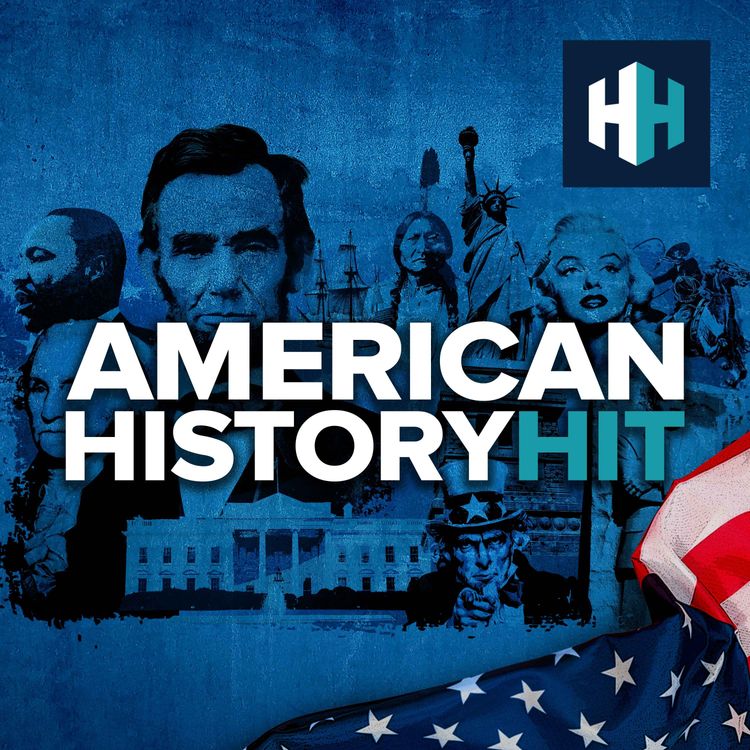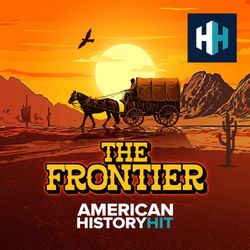Share

American History Hit
Hudson River: America's First Art Movement
English-born artist Thomas Cole emigrated to the United States in 1818. Six years later he began what is now known as the Hudson River School, which became the first art movement of the United States.. Betsy Jacks, director of the Thomas Cole National Historic Site, tells Don how these artists captured the country's awe-inspiring natural beauty, at a time when the US was rapidly industrialising. Framing an image of America that would illustrate the spirit of the continent and the nation that sought to conquer it.
Produced and mixed by Benjie Guy. Senior Producer: Charlotte Long.
For more History Hit content, subscribe to our newsletters here.
If you'd like to learn even more, we have hundreds of history documentaries, ad-free podcasts, and audiobooks at History Hit - subscribe today!
More episodes
View all episodes

362. Life and Death on the Oregon Trail | The Frontier
51:30||Ep. 362In the first instalment of our Frontier miniseries, we explore one of the most iconic symbols in American history: the Oregon Trail. For decades, thousands of Americans packed their lives into wooden wagons and set out for the West. They crossed sun-scorched plains without shade, climbed mountains without roads, and forded rivers that could turn deadly in an instant. Along the way, many buried loved ones beside the trail and pressed on.What compelled ordinary people to leave everything behind and walk nearly two thousand miles into uncertainty? How much did they truly understand about the dangers ahead? And what was daily life really like - day after exhausting day - on the trail?Our guest today is Stephen Aron, Calvin and Marilyn Gross Director and President & CEO of the Autry Museum of the American West. Stephen is Professor of History, Emeritus at the University of California, Los Angeles. His works include ‘The American West: A Very Short Introduction,’ and most recently ‘Peace and Friendship: An Alternative History of the American West.’Edited by Tim Arstall. Produced by Tomos Delargy. Senior Producer was Freddy Chick.Sign up to History Hit for hundreds of hours of original documentaries, with a new release every week and ad-free podcasts. Sign up at https://www.historyhit.com/subscribe. All music from Epidemic Sounds.American History Hit is a History Hit podcast.
361. The Making of Malcolm X
52:19||Ep. 361Known by the end of his life as El-Hajj Malik El-Shabazz, the Black Nationalist leader best known as Malcolm X died at just 39. Despite his short life, however, his legacy continues to this day.Don is joined by Clarence Lang today, who introduces us to this legendary figure and takes us through the events that made him who he was.Clarence is the Susan Welch Dean of the College of the Liberal Arts and professor of African American studies at Penn State. He is currently working on his third book, 'Malcolm X: A Political Biography of Black Nationalism and the African American Working Class'.Edited by Tim Arstall, produced by Sophie Gee. Senior Producer was Freddy Chick.Sign up to History Hit for hundreds of hours of original documentaries, with a new release every week and ad-free podcasts. Sign up at https://www.historyhit.com/subscribe. All music from Epidemic Sounds.American History Hit is a History Hit podcast.
360. Darkest Hours: Origins of Slavery
47:37||Ep. 360The Origins of Slavery in America, from its early colonial history to its expansion after the Revolutionary war, is the darkest chapter of American history. In this episode, we'll explore how European colonists first brought enslaved Africans to the Americas, how legal frameworks were devised to uphold the practice and what they were forced to endure on the plantations.Today we welcome Justene Hill Edwards, Historian and Professor at University of Virginia, as our guest on today’s episode. Justene is the author of Savings and Trust: the Rise & Betrayal of the Freedman’s Bank, which was the Winner of the 2025 Frederick Douglass Book Prize.Edited by Tim Arstall. Produced by Tomos Delargy. Senior Producer was Freddy Chick.Sign up to History Hit for hundreds of hours of original documentaries, with a new release every week and ad-free podcasts. Sign up at https://www.historyhit.com/subscribe. All music from Epidemic Sounds.American History Hit is a History Hit podcast.
359. Rodeo: An All American History?
33:47||Ep. 359Roughstock, roping and risk - the sport and spectacle of rodeo has become one of the most iconic American pastimes over the last couple of centuries. But where did it begin and how has it changed over time?Don is joined by Dr Tracey Hanshew, Assistant Professor of History at Eastern Oregon University. Tracey's article, 'Here she comes wearin’ them britches!’ Saddles, Riding Skirts, and Social Reform in the Turn-of-the-Century Rural West,' was recently published in Montana The Magazine of Western History.Edited by Tim Arstall, produced by Sophie Gee. Senior Producer was Freddy Chick.Sign up to History Hit for hundreds of hours of original documentaries, with a new release every week and ad-free podcasts. Sign up at https://www.historyhit.com/subscribe. All music from Epidemic Sounds.American History Hit is a History Hit podcast.
358. Darkest Hours: The Kent State Shootings
42:51||Ep. 358On May 4 1970, four students were shot dead by the Ohio National Guard during a protest. What were they protesting? Why were the National Guard brought in? And what chain of events led them to shoot?Don is joined by historian Brian VanDeMark, formerly of the United States Naval Academy, whose latest book is Kent State: An American Tragedy.Edited by Aidan Lonergan, produced by Sophie Gee. Senior Producer was Freddy Chick.Sign up to History Hit for hundreds of hours of original documentaries, with a new release every week and ad-free podcasts. Sign up at https://www.historyhit.com/subscribe. All music from Epidemic Sounds.American History Hit is a History Hit podcast.
357. The Monroe Doctrine
45:15||Ep. 357A two-hundred-year-old presidential speech has shaped how the United States sees its role in the world ever since. At the time, it sounded like a modest declaration from a young and uncertain nation. What would come to be known as the Monroe Doctrine would grow into something far more powerful... and far more controversial.Christopher Nichols, Professor of History at Ohio State University, joins us for this episode. Chris is the Wayne Woodrow Hayes Chair in National Security Studies and his works include ‘Rethinking American Grand Strategy’ and ‘Promise and Peril: America at the Dawn of the Global Age’. He has previously appeared on Ep. 261 ‘President Eisenhower: War on Soviets and Segregation’Edited by Aidan Lonergan. Produced by Tom Delargy. Senior Producer is Freddy Chick.Sign up to History Hit for hundreds of hours of original documentaries, with a new release every week and ad-free podcasts. Sign up at https://www.historyhit.com/subscribe. All music from Epidemic Sounds.American History Hit is a History Hit podcast.
356. Darkest Hours: The Great Depression
48:58||Ep. 356The Great Depression was, as Professor John Moser puts it, the result of a perfect storm. So what brought it on? What was it like to live through it? And could it have been prevented in any way?In this second episode of our series on America's Darkest Hours, we are examining the disastrous fall out of the great depression with John Moser. John is a Professor at Ashland University and author of 'Global Great Depression and the Coming of World War II'Edited by Aidan Lonergan, produced by Sophie Gee. Senior Producer was Freddy Chick.Sign up to History Hit for hundreds of hours of original documentaries, with a new release every week and ad-free podcasts. Sign up at https://www.historyhit.com/subscribe. All music from Epidemic Sounds.American History Hit is a History Hit podcast.
355. Battle of Baton Rouge: Civil War on the Mississippi
37:39||Ep. 355The Civil War along the Mississippi was reaching a critical moment by the Summer of 1862. The Union had advanced and planted its flag in Louisiana’s state capital without firing a shot. To many observers, Confederate grip seemed to be slipping away for good. But before that was for certain, one desperate gamble remained...Today, we’re telling the story of the lesser known Battle of Baton Rouge: why it happened, how it unfolded, and the accounts of those who witnessed it. On today's show, Don welcomes Prof. Aaron Sheehan-Dean of Louisiana State University back onto the show. His works include ‘Why Confederates Fought: Family and a Nation in Civil War Virginia’ and most recently ‘Fighting with the Past: How Seventeenth Century History Shaped the American Civil War’.Edited by Aidan Lonergan. Produced by Tom Delargy. Senior Producer is Freddy Chick.Sign up to History Hit for hundreds of hours of original documentaries, with a new release every week and ad-free podcasts. Sign up at https://www.historyhit.com/subscribe. All music from Epidemic Sounds.American History Hit is a History Hit podcast.
354. Darkest Hours: Brother Against Brother
36:05||Ep. 354There is no question that the Civil War is one of the darkest chapters in American history. With roughly 2.5 percent of the population lost, a higher number of Americans than in both World Wars combined.In portraying the war in history, however, we often focus on the tragic division of loyalties in the the United States - the predicament of brother fighting brother.To discuss this idea - where it came from, how true it is and how it has been used by various parties - Don is joined once more by Aaron Sheehan-Dean. Aaron is the Fred C. Frey Professor of Southern Studies at Louisiana State University, and author of ‘Reckoning With Rebellion: War and Sovereignty in the Nineteenth Century’.This is the first in a series on America's Darkest Hours. In the coming weeks we will explore the Great Depression, the Kent State Shootings and the origins of slavery.Edited by Aidan Lonergan, produced by Sophie Gee. Senior Producer was Freddy Chick.Sign up to History Hit for hundreds of hours of original documentaries, with a new release every week and ad-free podcasts. Sign up at https://www.historyhit.com/subscribe. All music from Epidemic Sounds.American History Hit is a History Hit podcast.